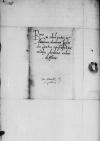Quemadmodum Reverendissima Dominatio Vestra ex litteris ⌊reverendissimi domini mei⌋ cognoscet uberius, allatae sunt ex ⌊comitiis⌋ Sredensibus litterae. In iis nihil de ⌊vicino⌋ prorsus scribitur neque hic de congressu isto certi quicquam habemus. Ceterum Danicum negotium est ⌊illi⌋ vehementer curae. Scripsit huc prolixas litteras, quibus condiciones obtulit, quibus confici pax posset, procul dubio de soceri sententia. Dabitur a me opera, si fieri possit, ut exemplum litterarum per alium nuntium Reverendissimae Dominationi Vestrae mittatur. Nunc enim absum a ⌊reverendissimo domino⌋ neque cum eo agere ea de re licet, sed proficiscetur brevi Ioannes von Pelcken.
Sumus hic valde incommode. Heri ita fluctuabat navis, ut non longe a periculo affuerimus.
Schedam ostendi ⌊reverendissimo domino⌋. ⌊Is⌋ eam ipse quidem legit, sed ⌊maiestati regiae⌋ lecta adhuc non est. Ob eam causam retinui, cum perlecta fuerit ⌊maiestati regiae⌋, remissurus.
De ⌊capitaneo Braunsbergensi⌋ confecta est res ex sententia. Liberalior fuit opinione nostra
serenissima or sacra⌈serenissimaserenissima or sacra⌉
⌊maiestas regia⌋, quae iam, Deo sit gratia, valet melius et ab omni dolore libera esse videtur. Non abs re faceret Reverendissima Dominatio Vestra, si admoneret illam, ut ab intempestivis  BCz 1618, p. 516 venationibus abstineret. Nam haec aetas eadem illa ferre non potest, quae priores anni facile hidden by binding⌈[le]le hidden by binding⌉ tulerunt.
BCz 1618, p. 516 venationibus abstineret. Nam haec aetas eadem illa ferre non potest, quae priores anni facile hidden by binding⌈[le]le hidden by binding⌉ tulerunt.
Ex ⌊Hungaria⌋ nihil adfertur, nisi hidden by binding⌈[si]si hidden by binding⌉ hidden by binding⌈[] hidden by binding⌉ quod ⌊Monachus⌋ respirasse iam se scribit et hidden by binding⌈[t]t hidden by binding⌉ est animo meliore. De ⌊caesare⌋ mirum es hidden by binding⌈[s]s hidden by binding⌉t nunc silentium. ⌊Comitia⌋ prorogata esse ad hidden by binding⌈[ad]ad hidden by binding⌉ Epiphaniarum diem scripsi antea. De loco nihil adhuc est mutatum, quandoquidem hidden by binding⌈[m]m hidden by binding⌉ convalescit iam serenissima or sacra⌈serenissimaserenissima or sacra⌉ ⌊maiestas regia⌋, neque mutatum iri quicquam puto. ⌊Cracovia⌋ a contagione libera iam esse dicitur, Deo sit hidden by binding⌈[sit]sit hidden by binding⌉ gratia.
Quem precor, ut Reverendissimam Dominationem Vestram diu servet incolumem. Cuius me gratiae commendo.
 BCz 1618, p. 516 venationibus abstineret. Nam haec aetas eadem illa ferre non potest, quae priores anni facile hidden by binding⌈[le]le hidden by binding⌉ tulerunt.
BCz 1618, p. 516 venationibus abstineret. Nam haec aetas eadem illa ferre non potest, quae priores anni facile hidden by binding⌈[le]le hidden by binding⌉ tulerunt.


